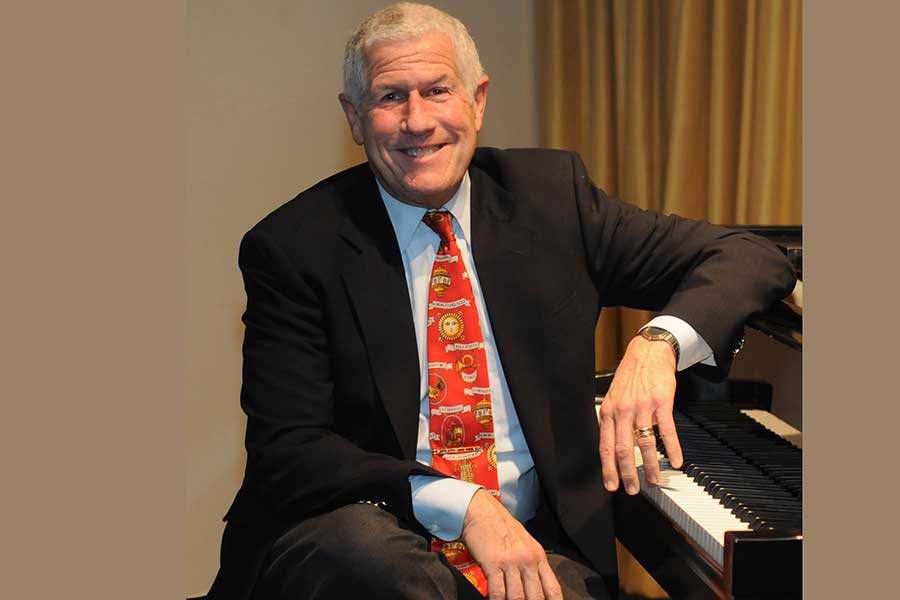“Who knows what’s next musically? Lennie didn’t. And, neither do I.”
It’s 2:30 a.m., and Philadelphia pianist Andy Kahn is talking about fellow jazz pianist Lennie Tristano, whose improvisational melodies and arrangements, though deeply and rivetingly complex (atonal at times), focused on beauty and freedom. From the simplicity of a love song such as “I Surrender Dear” (with lyrics such as “I may seem proud, I may act gay, It’s just a pose, I’m not that way”) to albums such as 1962’s strange, stirring “The New Tristano,” the late pianist-composer is a portrait in risk and unique display.
Looking at the life and career of Kahn — essayed in these pages over a decade ago in connection with his partner Bruce H. Cahan, their design studio, Karen Young (Kahn co-wrote the disco smash “Hot Shot” for her) and The DCA — Philly’s own pianist is no less unique.
Kahn will host an evening of solo piano, duets with saxophonist Larry McKenna and trios with bassist Nick Krolak and drummer Bruce Klauber dedicated to Tristano April 21 at Chris’ Jazz Café.
“My first influence was Oscar Peterson, when I was 14,” Kahn explained. “For me, it was only Oscar. Still, Klauber insisted I expand my horizons and listen to other jazz pianists. I wouldn’t accede to this ’til one fateful night.”
Kahn traveled to New York City to hear Bill Evans.
Five feet from the adventurous pianist perched at the Steinway on the stage at the Top of The Village Gate, Kahn was mesmerized. This led to a new diet of pianists: Bud Powell, Thelonious Monk, Art Tatum then Tristano.
“That threw me off the bridge: chordal and melodic lines I’d never heard before — not just new runs, but concepts that seemed to belie the harmonic structure of a given standard tune, yet was always still there somehow, running in the background,” Kahn said. “Lennie’s approach to playing turned my head around, and I began a lifelong, continuing exploration into how he began substituting chord changes with further-substituted chords. His contrapuntal figures — with each hand seemingly delivering a different time signature, yet somehow interacting with the other, even though they might appear to be in opposition — remain mysteries of Lennie’s that I continue to try to unravel.”
“Unfurling” is how one might best describe Kahn’s magnificent life.
An Overbrook Park native who, by age 9, became a professional actor, Kahn was an inaugural member of the Southwark Repertory Theater Group, formed at Theater of the Living Arts in 1964, under the not-yet-internationally famed director André Gregory. He got his first piano job at The Saloon at age 15.
“My father used to drive me in on Mondays and Tuesdays, drive back to Penn Valley to take a snooze, then back to South Philadelphia to pick me up at 11 p.m.,” he recalled.
In 1970, Kahn built and started Queen Village Recording Studios, formed The All-Star Jazz Trio in 1972 with drummer Klauber, did the rounds of Philly’s piano-bar scene (Borgia Cafe, H.A. Winston) then made an international success of himself and his studio “with disco on the upswing,” producing and co-writing Young’s “Hot Shot” in 1978.
“I politely turn down requests to perform the song as Karen is no longer with us,” Kahn noted. Also no longer among Kahn’s living and loved is acclaimed DJ Kurt Borusiewicz, who “could thoroughly entrance throngs of bodies that packed his dance floor nightly at the DCA” and who became his “Hot Shot” co-writer.
“In Kurt, I discovered a musical partner who understood dance music like no one else I’d known.”
Buoyed by success and working with RSO (the label famed for “Saturday Night Fever”), Kahn made a date with a “charming, handsome fellow,” Bruce H. Cahan, in 1979 and never left.
“After 36 years together, which began that fateful night in March 1979, continued uninterrupted,” the pair married after all U.S. states legalized marriage equality. “So, the first, and only, gay wedding ever held at Dante & Luigi’s with 20 of our closest friends, colleagues, relatives and presided over by Judge Lynne Abraham, occurred November 2015.”
Along with Cahan, Kahn shares his time with Klauber, bassist Bruce Kaminsky (the whole of the All-Star Jazz Trio, whose members “experience mental telepathy”) at Square on Square every Wednesday night. On the occasions that intuitive vocalist Peggy King comes to sing with the All-Stars, the number of three minds thinking alike expands to four.
“Peggy swings us, rather than the other way around,” Klauber said.
“No one has ever inspired us like Peggy,” Kahn added.
Then there’s Tristano, a player strongly in favor of allowing “melody” to dictate the direction of “harmony” — a practice that vastly differs from the universally accepted methods.
“Lennie’s introduction of ‘free-jazz’ improvisation introduced new territory, emanating from ‘melodic’ interpretation and creativity, based on where the melody seemed to want to go — not upon scales, tonal or modal — in its construction … melody that found its own course, traveled an original path, one without constraint.”
That sounds a lot like Andy Kahn.
Andy Kahn and Larry McKenna perform a tribute to Lenny Tristano at 8 and 10 p.m. April 21 at Chris’ Jazz Café, 1421 Sansom St. For more information or tickets, visit http://www.chrisjazzcafe.com/events/15842.
